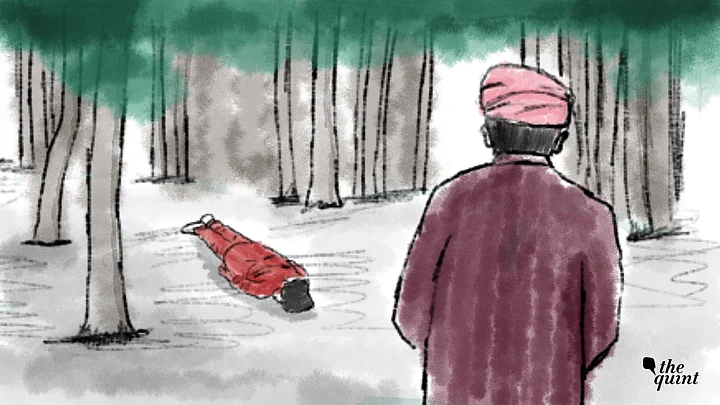Disturbed by what he had just seen, 62-year-old Jagdish Singh rushed to the hills to meet Gujjar Bakarwals, a nomadic Muslim tribe in Jammu and Kashmir. He left his cattle behind, and stopped only after he met the 8-year-old victim’s mother.
"'Teri kudi ki dead body udhar payi hain,' maine Bakarwal ko sunaya (Your daughter's dead body is lying there, I told the Bakarwals)," Singh said, his heart racing as he told the rape victim’s mother Sama*.
A year after, Singh recalls finding the girl’s body in the Rasanna forests of Kathua, Jammu and Kashmir. The girl was allegedly drugged, raped and killed at a temple in January 2018, according to a charge sheet filed by the crime branch of Jammu and Kashmir Police in April last year.
“I saw through the branches of trees and leaves, she was wearing red,” he told The Quint. The girl had been missing for over a week when Singh found her body.
Singh belongs to the Hindu Gaddi nomadic tribe, which lives in Udhampur, Doda and Kathua districts. Like the Bakarwals, the Gaddis rear goats and sheep, but they are Hindus, so there aren’t any tiffs over land and water with the Hindu community in the region.
"Dar lagda janaab, mein aage nahi gaya. (I felt scared and didn't go ahead) I saw her from a distance, left my cattle unattended and turned away," Singh said. When asked how he knew the girl, he answered, "The entire village was looking for the 8-year-old child. There were policemen coming in and out too."
Sama* confirmed to The Quint that Singh was the first to give her the news. "Jagdish jaldi jaldi chalte hue aaya, uski pagdi uske haath ke neeche dabi hui thi. (Jagdish was walking hurriedly when he came here. His turban was tucked under his arm). I thought it was about his sheep that he couldn't find, so he was coming to ask us if we had seen them. I could never anticipate the words that would come out of his mouth," she said.
Sama and her husband Yunus*– who had adopted their niece when she was one – silently followed Singh to the forest. This was the first time in several days that they had heard news about their daughter. Sama said she couldn't help but cry, and kept hoping that Singh was wrong. On the other hand, Yunus held himself together through the 10 minute-walk, which would change their lives.
The couple’s worst fears had come true. Sama wanted to hold her daughter close, but Singh stopped her. "Jagdish was also crying. He said I should not touch her as the police should investigate the scene. I listened to him," she said, adding that the Gaddis and Bakarwals have a cordial relationship as both the nomadic tribes have an understanding that binds them.
Singh said he stepped back as the Bakarwals, the Hindus from Rasanna and policemen reached the site in Kathua. He felt that he had no place in the commotion, he said.
"I was distracted by someone who said my cattle was scattered everywhere. Thinking of them as my child whom I could save in that moment, I took them to the dera we had set up close by," he said, adding that he did not venture outside or go deep inside the forests.
While Singh moves around with the cattle, his family is settled in Kathua’s Duggan block. He has two daughters Antana Devi and Dwarka Devi. "We also send our daughters to rear cattle, you know. Just like that child was. Bahut dar lagta hain, janaab (We feel very scared)," he said.
Singh has been interrogated by the police many times. "Kathua, Hiranagar, Jammu, the police has called me approximately four times since the incident," he said. Months after the incident, Singh was in Doda district when he was called by the police for questioning. "The last time they interrogated me was seven or eight months ago, I have no problem going repeatedly, but I have helped in whatever way I could have," he said.
In June 2018, the Supreme Court transferred the case from Jammu and Kashmir to a sessions court in Punjab’s Pathakot to ensure a fair trial. Proceedings began over a month later.
While the Gujjar Bakarwal community did not come to Rasanna village this year, the Gaddis have not stopped. Both the tribes rear cattle and sell them.
When residents of Rasanna were asked why there was a difference in the way both the tribes were treated, they outlined why they had stopped giving the Bakarwals access to water and fields.
"The difference is, they are Hindu and those are Muslims (Bakarwals). The Muslims are thieves, they use our land for cattle rearing and take water from us, but they do not pay up. These Gaddis and us have an understanding. They give us money too," ex-serviceman Bishan Das Sharma (77), who lives in the village, said.
The sentiment was echoed by 65-year-old Vishnoi. "They are not people of good attitude. In the Rasanna forests, we only give the Gaddis our pastures and forests, not the Gujjar-Bakarwals. They come uninvited, we do not want them to come back. Things are peaceful this way," she said.
To come back to the same village a year on wasn't a choice for Singh. "Aapka shahi unpadh hain, sirf bhed bakri charana aata hain (I am illiterate and I can only rear cattle.) I don't understand the world and its ways. Here people know me, there is trust and understanding. I am a poor man, I cannot just resettle or go to another village," he said.
"I keep thinking of her mother crying profusely while walking behind me. She was trying to be subtle. May be I should have broken the news to them in another way," Singh asked.
(* Names of the victims’ parents have been changed to protect their identities)
